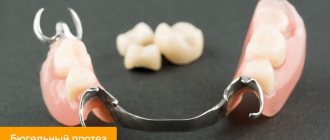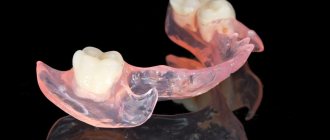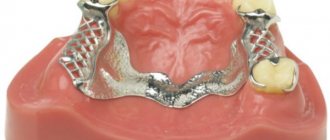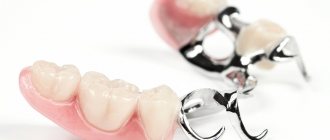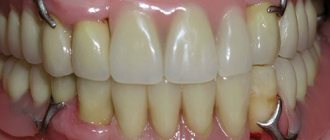Clasp prosthesis with locks
- one of the varieties of partial clasp removable structures, which is fixed on the supporting teeth with the help of locks.
This option is considered one of the most advanced designs. Clasp dentures with locks consist of a metal frame in the form of an arc. The frame is a plastic base with artificial teeth with fastenings-locks. One fastening element of the prosthesis is located on the supporting tooth under a metal-ceramic crown, and the second is located directly on the clasp prosthesis. This type of prosthesis has another name - clasp prosthesis with attachments
(from the English word “attachment”, which is translated as “fixation”, “attachment”).
Consultation with an orthopedic dentist—RUB 1,000.
Double-sided clasp prosthesis with locks - RUB 71,000.
Double-sided clasp prosthesis using Bredent locks - RUB 50,000.
Friction pin - RUB 9,200.
At CELT you can get advice from a dental specialist.
- The cost of an orthopedic consultation is 1,000
Make an appointment
Indications
The main indication for the use of clasp dentures with locks on the upper or lower jaw
is the impossibility of installing implants. It is also important to have supporting teeth on which they can be securely fixed. As for other indications, they are as follows:
- terminal defect of the dentition on one or both sides;
- a large extent of the dentition defect, i.e. the absence of several teeth in a row.
Contraindications
- the frenulum of the tongue is not long enough;
- deep bite;
- pathological conditions of the oral cavity in the acute stage;
- diabetes;
- individual metal intolerance;
- lack of supporting teeth;
- pathologies of oncological nature;
- insufficiently deep floor of the oral cavity.
Features of locking
Clasp dentures with locks can be used on the upper and lower jaws, thanks to their reliable fixation. Clasp dentures with attachments, photos of which you can see on our website, have supporting parts that are located on the inside of the oral cavity. They are ideal for use with the last teeth extracted and with extracted teeth limited to other teeth. The locking mechanism consists of two parts: the first (matrix) is integrated into the crown or other non-removable structure, and the second (matrix) is connected to the base of the prosthesis. It is worth noting that, unlike the clasp variety of yoke dentures, locking analogues eliminate the transfer of intense loads to the supporting tooth. The only drawback is the higher cost of clasp dentures with locks
. Prices are determined by the labor intensity and complexity of their production. However, clasp dentures with locks, the prices of which are slightly higher than clasp dentures, will “work out” every ruble invested in them. They are very convenient and easy to use, do not affect diction, and do not cause discomfort when eating.
Indications for installation of a locking clasp prosthesis
A clasp prosthesis of a locking type is used in the following cases:
- absence of 3 or more teeth in a row on the front or side of the jaw;
- impaired diction and chewing function due to the loss of one or more teeth;
- mobility of the dentition in advanced stages of periodontitis;
- atrophy of the alveolar processes (dental bed), in which it is impossible to place a plate (acrylic, nylon) prosthesis;
- bruxism (night grinding of teeth) or increased wear of enamel;
- atrophy of the jaw bone tissue and other pathologies in which it is impossible to perform dental implantation.
Clasp lock device
Fixation with micro-locks has its own characteristics. Thus, half of the element is located directly on the orthopedic structure, and the second is on the supporting teeth, hidden under metal-ceramic crowns. Reliable fixation of the prosthesis is carried out by clicking the lock and prevents it from moving or falling out. The type of micro-lock plays an important role in this case. According to reviews of clasp dentures with doctors’ locks, the best types of locks are “MK-1” and “Bredent”, made in Germany. "MK-1" is a bolt-type lock, but the clasp prosthesis is based on "Bredent" locks
has a friction type attachment. It is very important that not only the prosthesis itself is of high quality, but also that its lock is reliable and durable.
What is important to pay attention to!
The most important part of the clasp prosthesis is its metal frame with a fixation system built into it. Initially, the frames of clasp dentures were made only by casting, for which a cobalt-chromium alloy (CCH) was used. Nowadays, the method of one-piece casting on a refractory model is still widely used, but more modern methods have now appeared that make it possible to increase the accuracy of the manufacture of this prosthesis in the dental laboratory.
For example, frames can be made using the modern method of “selective laser melting”, not only from CCS, but also from titanium. The use of titanium made it possible to both increase the strength of the metal frame (titanium is 5 times stronger than KHS) and reduce the weight of the clasp prosthesis by approximately 2 times. Reducing the weight of the prosthesis greatly facilitates getting used to it. Another modern method of manufacturing a metal frame for partial dentures, as well as caps for telescopic crowns, is milling on a computer-controlled machine (CAD/CAM technology).
You need to find out which method will be used to make your particular prosthesis during your initial consultation with your dentist. As a rule, small clinics that have their own dental laboratory do not have special milling equipment and a machine for selective laser melting (due to their high cost). We hope that our article: Clasp dentures reviews, price – was useful to you!
Sources:
1. Personal experience as a dentist, 2. “Orthopedic dentistry. Textbook" (Trezubov V.N.), 3. National Library of Medicine (USA), 4. https://www.realself.com/, 5. "Removable dentures: a textbook" (Mironova M.L.), 6 "Teeth restoration with clasp dentures (Fadeev R.A.).
Where to make?
If you want to be sure of the quality of the clasp prosthesis (Moscow)
and its installation, as well as the fact that they will select for you exactly the option that will best suit your individual characteristics, contact the orthopedic dentistry of our CELT clinic. The quality of our designs allows:
- distribute the chewing load evenly;
- prevent loosening of teeth;
- guarantee a high level of aesthetics;
- provide physiological load on the tooth;
- prevent damage to enamel and gum tissue when removing/installing a prosthesis.
Constructions using telescopic crowns
This option of prosthetics is considered quite popular in Western countries, but the above-mentioned clasp dentures are not popular in Moscow and other cities of the Russian Federation. The essence of the technique is as follows: initially, the supporting units are prepared, then metal caps are placed on them. A special cement composition is used to fix the orthopedic product.
As a rule, the above metal caps serve as supports for crowns located on the clasp and connected to the metal base of the structure. This fastening method promotes strong fixation of the prosthesis, allows for optimal distribution of the chewing load, provides the necessary aesthetic effect and has more reasonable prices compared to products with clasps.
Advantages:
- Excellent aesthetic characteristics (metal elements are hidden under the crowns);
- Maximum reliable fixation of the orthopedic structure;
- The ability to chew food thoroughly without experiencing pain;
- Long period of operation - about seven years;
- Quick adaptation due to the small volume of the prosthesis, eliminating diction disorders;
- High repairability of the structure;
- The rigidity of the metal that underlies the structure determines the uniform distribution of the load throughout the entire dentition, which makes it possible to stop gum atrophy.
What is clasp prosthetics?
A distinctive feature of the clasp is comfortable wearing, which is achieved thanks to the reduced volume and thickness of the base.
A clasp denture is one of the types of removable structures, the basis of which is a metal arch with plastic fragments imitating gums and artificial teeth fixed on it.
A clasp is a metal arch that follows the shape of the jaw. The purpose of the prosthesis is to restore teeth, both in the upper and lower rows.
In addition to the metal base and simulating fragments, the design has fixing elements that ensure strong fastening of the arch in the oral cavity.
The orthopedic product represents a worthy alternative to removable plate and flexible nylon prosthesis.
A distinctive feature of the clasp is its comfortable wearing, which is achieved thanks to the reduced volume and thickness of the base.
The basis of the clasp design performs several functions simultaneously:
- connects artificial gum fragments and teeth;
- provides support for the prosthesis;
- stabilizes the position in the oral cavity.
When making lower row prosthetics, the arch is located on the side of the tongue (at the midpoint between the bottom of the mouth and the level of the gum edge). The parameters of the arc are adjusted (made narrower or wider) so as not to create discomfort to the frenulum of the tongue.
The prosthesis for the upper dentition has a palatal bridge. It connects the saddle-shaped points of the structure and corrects the chewing load, bringing it as close as possible to the physiological one.
What is the price?
The cost of a clasp denture with locks depends on which clinic you go to. If you want to be sure of the quality of the design, you should not save. Approximate prices for Moscow are as follows:
- One-sided clasp design - from 40 thousand rubles;
- Clasp prosthesis with reliable “Bredent” locks - from 40 thousand rubles;
- Clasp prosthesis with reliable locks “MK-1” - from 50 thousand rubles.
You can find out the prices of clasp dentures at the CELT clinic in this section or by calling us and making an appointment for a consultation.
Prices
Average prices in private dentistry:
- design with 2 dental crowns – 35,000 rubles;
- design with 4 crowns – 45,000 rubles;
- one-sided prosthesis – from 30,000 rubles;
- device for the entire jaw - about 50,000 rubles.
Additionally, you will have to pay for taking dental impressions - 1000 rubles. These casts are needed to make a plaster model of the jaw, which will be used to make an individual design. The production time for the device is 12-14 days.
If you are looking for a dentistry with optimal prices for dental prosthetics, we suggest using the information on our website. The largest database of specialized institutions is collected here.
How to care?
Orthopedic structures require proper care. This is the only way they will provide their owners with maximum comfort and serve for a long time. Caring for them includes the following:
- Rinse the denture with clean boiled water after each meal;
- Regular cleaning at home using special solutions and brushes;
- Professional cleaning in dentistry.
Clasp prosthetics at the CELT clinic are performed by specialists with extensive experience. They have modern equipment and high-quality materials in their arsenal, which is the key to the success of the treatment. At the same time, we try to keep prices affordable and cooperate with modern, proven dental laboratories. Contact us!
Make an appointment through the application or by calling +7 +7 We work every day:
- Monday—Friday: 8.00—20.00
- Saturday: 8.00–18.00
- Sunday is a day off
The nearest metro and MCC stations to the clinic:
- Highway of Enthusiasts or Perovo
- Partisan
- Enthusiast Highway
Driving directions
Varieties and design features
There are several types of clasp-type dentures, the difference between which lies in the method of fixation:
- On clasps - the design includes metal hooks that provide fixation of the product to the supporting teeth on both sides simultaneously. During installation, grinding of the supporting teeth is not carried out.
- On the attachments , the product has micro-locks that ensure reliable fastening. Due to their small size, the fasteners are almost invisible. When chewing, the load is distributed mainly on the supporting units.
- On telescopic crowns , the prosthesis is fixed using special telescopes. These products are considered the most reliable, but the cost is very high, which is explained by the complex manufacturing technology and virtuosity of calculations. Before installing the structure, it becomes necessary to grind the supporting teeth, cover them with metal and polish them. Only highly qualified specialists can perform high-quality work (interaction between a dentist and a dental technician).
- Splinting - the arch of the prosthesis exactly follows the shape of the teeth, which ensures reliable fixation of the units. This factor determines the cases when installing a prosthesis is appropriate, namely tooth mobility.
On telescopic crowns
On attachments
On clasps
Splinting
On the upper jaw
Dentures for the upper jaw are made from openwork casting using durable medical alloys
Clasp prosthetics of the upper row is performed in the absence of one or more teeth.
If there is no tooth, 4 implants are implanted. The prosthetic structure at the location of the artificial teeth is fixed to the jaw, and the arch itself is fixed to the palate.
Among all types of clasp products, attachments and splinting dentures are popular when restoring the upper jaw.
Clasps meet functional needs, but significantly lose in aesthetics. Therefore, they are rarely used for the top row.
Dentures for the upper jaw are made from openwork casting using durable medical alloys.
The connecting element (palatal membrane) does not cover the entire surface of the palate, which makes the process of adaptation quick and comfortable. The peculiarity of upper jaw prosthetics is a more complex technique for performing the work.
Clasp prosthetics of the lower jaw are easier. The design of the prosthesis looks simpler; it lacks the palatal part. The entire load is borne by the supporting teeth, to which the product is fixed. All types of clasp dentures are suitable for restoring the lower dentition.
Contraindications
There are restrictions on the installation of clasp dentures.
They concern the following cases:
- if the patient has a deep bite;
- in the presence of pathological processes in soft tissues and on the oral mucosa;
- when supporting teeth are missing or if they are low;
- with severe jaw atrophy;
- with a high location of the attachment point of the frenulum of the tongue;
- if there are inflammatory processes in the mouth;
- when the floor of the mouth is shallow;
- with stubborn mucosa in the area of missing teeth.
A contraindication to the installation of an arched structure is the presence of an allergy to one of the components used in the production of the prosthesis, for example, to metal.
During the examination, the orthopedist may postpone prosthetics for the following reasons:
- due to pregnancy;
- if the patient uses drugs;
- during the patient's treatment with radiation therapy.
Installation of prostheses of all types becomes impossible with the following health conditions:
- if the patient is diagnosed with mental disorders;
- diabetes;
- in the presence of problems with the respiratory system, occurring in an acute form;
- oncology;
- exacerbation of diseases of the cardiovascular system.
Types of locks, lock fastenings
Clasps for the upper jaw are available in several versions, which differ mainly in shape:
- ring;
- horseshoe-shaped;
- in the form of a transverse strip.
Designs with clasps are considered the most common.
Varieties of this group differ in retaining elements:
- Roach's clasps look like T-shaped extensions that extend from the frame arc and are placed in recesses. The products provide good fixation, but the process of placing them is quite complicated.
- Bonneville clasps represent a group of reversible structures. Crossing the occlusal surface transversely, they are placed on the vestibular and oral parts of the incisor (molar). It is appropriate to use in cases where there is a gap between the teeth. The clasp fills it completely, which eliminates the accumulation of food residues.
- Reichelman clasps are distinguished by their transverse design and the presence of an occlusal lining in the form of a special partition.
- Continuous clasp - the design is made up of several links fastened together. The product is placed orally or vestibularly. The peculiarity lies in the tight fit of each link to natural teeth, which ensures strong fixation.
- Embrasure clasps are essentially a type of Bonneville clasps, but the two elements included in the design are directed in opposite directions. The products perform a stabilizing function, so they are often used for splinting.
Continuous clasp
Embrasure clasp
Bonneville clasp
Roach's clasp
Reichelman clasp
By what parameters is the variety selected?
To solve problems with loose teeth, a splinting prosthesis is more suitable
Each type has a number of advantages, but the cast design is considered the most reliable, so when choosing the type of fastening, preference should be given to a solid product.
To solve problems with loose teeth, a splinting denture is more suitable.
Its design is created in such a way that natural teeth are fixed in their natural position.
With prolonged exposure of the units to the units, the neck of the tooth in the dentin is strengthened. The same products are recommended in case of malocclusion. The stabilizing properties of the arch make it possible to correct the defect during prolonged wear.
A locking design is chosen for partial loss of teeth, when several units are missing in a row. It is appropriate to use a clasp when there are supporting teeth, which will allow you to redistribute the load on them during chewing.
Alternative options
Most orthopedists consider clasp dentures to be the optimal way to restore dentition. But at the request of the patient or existing indications, an alternative may be offered.
Nylon constructions or Acry-Free dentures:
Conditionally removable dentures fixed on several implants:

